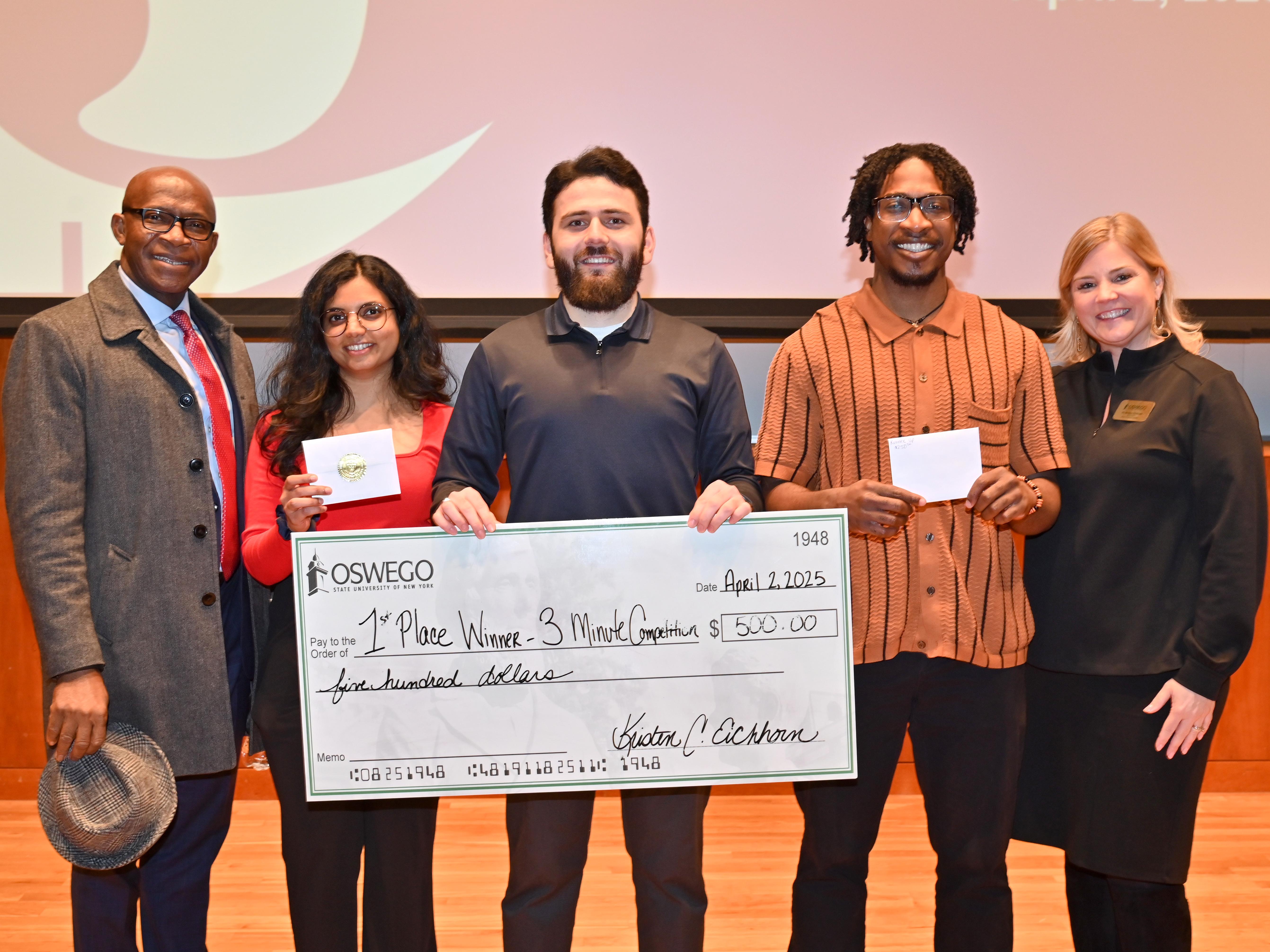This year’s 3 Minute Thesis competition featured presentations on exceptional research from graduate students on April 2. Shown from left are President Peter O. Nwosu, People's Choice winner Manali Shivapurkar, first place winner Muhammad Musozoda, runner up Michael-Daniel Vodzogbe and Graduate Studies Dean Kristen Eichhorn.
This year’s 3 Minute Thesis competition featured presentations on exceptional research from some of SUNY Oswego’s graduate students on Wednesday, April 2, in the Marano Campus Center auditorium.
From 13 competitors spanning disciplines and describing innovative projects, the top winners earning cash prizes were:
- First place: Muhammad Musozoda, Chemistry, “Next-Generation of thermally stable organic materials for advanced applications”
- Runner-up: Michael-Daniel Vodzogbe, Health Promotion and Behavioral Wellness, “The Wellness-Manager Initiative (TWMI)”
- People's Choice: Manali Shivapurkar, Human-Computer Interaction, “Enhancing dietary filters”
Musozoda’s presentation detailed developing a new class of heat-resistant molecules that can withstand temperatures of 300 degrees Celsius for over 96 hours in air without degrading. These phosphorus-containing molecules maintain functionality under these extreme conditions while also offering customizable properties. Learn more about his research via this story.
“These materials feature specific molecular designs that prevent evaporation and resist breakdown when exposed to heat and oxygen,” Musozoda explained in an abstract.
“Our analysis revealed key structure-property relationships that explain their remarkable stability,” Musozoda noted. “Some variants display strong fluorescent properties. The combination of thermal durability and light emission makes them suitable for multiple applications, including heat storage systems, advanced nuclear reactor coolants and components in electronic devices operating in high-temperature environments.”
Vodzogbe’s presentation probed the challenge of students missing out on valuable knowledge during learning tasks they might find uninteresting, especially when impacted by external factors like mental health, financial insecurity and emotional distress.
“TWMI reshapes learning through the 8 Dimensions of Wellness, making education engaging and meaningful in different fields,” Vodzogbe wrote in an abstract. “Wellness covers many aspects of life, and TWMI educates students through immersive activities and programs. By transforming the learning environment into a fun and free space, TWMI helps students, our future leaders, retain valuable knowledge to improve both their academic and personal lives.”
Shivapurkar’s presentation involved a self-initiated case study to enhance learning, with a goal of designing a dietary filter for DoorDash to make meal selection easier for users with dietary needs.
“I identified key pain points through user research like lack of personalization and time-consuming searches,” Shivapurkar wrote in an abstract. “I tested two design versions using Figma prototypes and collected qualitative and quantitative data. Results showed Design 1 was more intuitive, reducing task completion time and improving ease of use. Users preferred its accessibility and visual hierarchy. This project strengthened my skills in UX (user experience) research, A/B testing and usability analysis.”
The challenging structure of the competition asks students to present their research in an engaging manner to a general audience in three minutes or less while only using one static slide they create.
“Oftentimes afterwards, they’ll share with me what a rewarding experience it has been,” said Kristen Eichhorn, dean of graduate studies. “Something that they recall as being one of the most impactful experiences in their graduate program. So we’re thrilled to be able to give that to them.”




